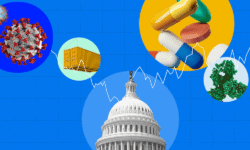Since the inception of the COVID-19 pandemic, artificial intelligence (AI) has ushered in a transformative era in drug discovery, development, and healthcare. While this technology has long been used in biopharma for small-molecule modeling and drug screening, the applications of AI now reach far beyond those initial purposes—from R&D and drug discovery to manufacturing and commercialization.

Today, the use of AI has become indispensable in the life sciences sector, revolutionizing key processes across the entire drug development continuum. From identifying potential drug candidates and optimizing molecular structures to streamlining clinical trial design and enhancing personalized medicine, this technology is driving unprecedented efficiency and innovation.
According to Precedence Research, the AI market within the healthcare sector is projected to surpass $20.6 billion in 2023. This estimation reflects a remarkable growth trajectory, nearly doubling the figures observed in 2021, which stood at $11.1 billion. Aiding in the quick adoption of AI within biopharma is the exorbitant cost of R&D. The typical time needed to develop a therapy is 12 to 18 years while the failure rate is an astonishing 90%—AI tools can significantly reduce both.
Below, we dive into the top use cases of AI within the biopharma space, major investments being made by leaders of the industry, and provide our outlook on the future of this technology.
Use Cases and Applications of AI in Biopharma
While artificial intelligence is revolutionizing nearly every industry, the life sciences sector is particularly benefited by this technology’s wide range of applications—transforming the way research, development, and healthcare are conducted.
Below, we dive into how AI is streamlining processes, as well as contributing to money and time savings, within biopharma:
Research in Drug R&D
Already, AI is evaluating drug research, imbuing traditional processes with predictive capabilities and unprecedented efficiency. Through the use of complex algorithms, AI sifts through large datasets, identifying potential drug candidates and biomarkers much swifter than by manual means. This significantly truncates the drug discovery timeline, expediting progression to preclinical trials.
Further, AI’s predictive modeling algorithms refine drug target validation, thus reducing the attrition rates during the expensive clinical testing phases. In silico trials, powered by AI simulations, researchers can forecast the efficacy and safety profiles of new drugs before they reach human trials. This not only hastens the R&D process but also minimizes the risks associated with human subjects by identifying potential failures earlier.
Enhanced by the meticulous analysis of biomedical information, AI also tailors research strategies to the nuances of complex diseases. It serves as a formidable tool in designing intervention mechanisms that are more targeted, effective, and conducive to the intricate nature of human biology. Through the lens of AI, researchers are now able to see and understand patterns within data that previously eluded the human eye.
Drug Discovery
In the realm of biopharmaceuticals, AI serves as a pivotal force in streamlining drug discovery processes by reducing inefficiencies and accelerating development pipelines. Its capacity to digest vast datasets transforms the conventional methodology, reshaping the landscape of pharmacological innovation. Advanced algorithms predict molecular behavior, expediting compound selection, sequencing and synthesis—and consequently, elevating the probability of clinical success.
Further, AI-driven platforms intended for biopharma researchers enable precise drug design by leveraging structural biology, facilitating the creation of compounds with a higher likelihood of therapeutic efficacy. Such precision dramatically curtails the time and resources previously required for hit-to-lead and lead optimization stages.
And potentially most important, some AI systems confront one of the pharma industry‘s most pressing challenges: the high failure rate of drug candidates. By incorporating powerful predictive analytics, AI tools adeptly sift through pharmacological parameters, identifying promising drug candidates with greater specificity and at a fraction of traditional costs.
This paradigm shift hinges on the convergence of AI and machine learning techniques with domain expertise, heralding a new era in pharmacotherapy development where ‘fail fast, fail cheap’ methodologies are increasingly mitigated against more strategic, data-driven approaches.
Massive Data Analysis
It’s clear that the pharmaceutical industry is increasingly in need of handling and interpreting expansive datasets efficiently and accurately. AI excels in this task, employing machine learning algorithms that have the capacity to digest vast amounts of data more swiftly and effectively than humanly possible.
In the context of clinical trials, AI’s prowess in data science means outcomes can be predicted with greater precision, expediting the identification of potential adverse effects and therapeutic responses. By assimilating and analyzing clinical data at speed and scale, AI-powered systems are enhancing the safety profile of new compounds long before they reach human testing. This, in turn, helps to mitigate risks and refine recruitment strategies for patient cohorts.
Furthermore, when it comes to genomics and proteomics, the sheer volume and complexity of data are beyond the scope of traditional analytical methods. Here, AI serves as a crucial enabler, deciphering intricate biological patterns and interactions. These insights pave the path for personalized medicine, acknowledging the genetic variations that dictate how patients respond to drugs—ultimately elevating the precision of treatments.
AI’s contribution is invaluable in mining real-world evidence, aggregating data points from diverse sources such as electronic health records, wearables, and patient registries. This holistic view allows for a more nuanced understanding of drug effectiveness and safety in broader patient populations. Moreover, as regulatory bodies increasingly accept real-world evidence, AI-facilitated data analysis becomes central to regulatory approval processes.
The automation of data processing by AI is not only transforming the speed but also the quality of insights derived in biopharmaceutical research. These advancements are fundamental to the quest for developing novel therapies that are both effective and safe, thereby supporting a more efficient healthcare ecosystem.
Automating Workflows
Within the biopharma space, AI-driven automation streamlines lab processes, drastically reducing manual tasks in data analysis and management. The integration of these systems enhances operational efficiency, freeing scientists to focus on innovation. In short, automated workflows accelerate drug discovery and clinical trial processes while still promising precision and improved reproducibility, which impacts development timelines.
Automating workflows translates to optimized protocols in drug development. Machine learning algorithms can predict outcomes, streamlining protocols and reducing the time from discovery to clinical trials, thereby expediting the delivery of therapies to market.
The intersection of AI with robotic process automation (RPA) in biopharma yields a dramatic increase in productivity. By offloading routine, repetitive tasks to machines, cycles of experimentation are completed with more consistency, less error, and in significantly reduced timeframes. This symbiosis not only tightens the feedback loop in developmental research, but also manifests as cost savings and expedited timescales for bringing drugs to fruition.
Clinical Trials
By leveraging predictive analytics and data-driven insights, AI tools have the potential to transform how clinical trials are conceived, planned, and executed. They equip researchers with the foresight into patient selection, enrollment criteria, and potential trial bottlenecks. Subsequently, this enables a strategic allocation of resources towards the most promising research avenues. More importantly, the integration of AI into these processes can result in a significant reduction in both time to market and overall costs associated with the clinical trial phase.
Patient recruitment can also be simplified through AI algorithms. In the realm of clinical trials, AI-based systems excel, meaning they can rapidly identify candidate pools from vast databases. These pools are refined by algorithms that match patients to trials based on criteria ranging from genetic markers to demographic data. The ability to expedite this phase alone enhances operational efficiency profoundly.
Further, AI predicts and mitigates trial risks preemptively. The analytical prowess of AI systems in forecasting outcomes facilitates better decision-making concerning trial safety, effectiveness, and operational management. Insights drawn from historical data and real-time analytics predict events that could influence the trial’s course, enabling timely interventions that safeguard its integrity.
AI has become instrumental in monitoring clinical trial adherence, enhancing patient engagement, and reporting adverse events, utilizing connected devices and advanced analytics. This capability is transforming trial management into a more responsive, patient-centric operation that conforms with the stringent regulatory requirements of late 2023 and addresses the growing demand for personalized medicine. Such advancements herald a new era of precision in clinical trials, promising greater efficiency and success in the journey of drug development.
Marketing
Through AI, biopharma marketers can distill vast amounts of data to identify and segment their audience precisely. This hyper-targeting capability ensures that marketing efforts are exceptionally tailored to healthcare practitioners’ and patients’ needs.
The integration of AI in marketing strategies enables predictive analytics that can anticipate market trends and shifts in consumer behavior. Adapting to these changes positions biopharma brands advantageously in a competitive landscape, ensuring they remain relevant and visible.
By analyzing social sentiments and online interactions, AI provides insights into public perception and brand reputation. These analytics guide communication strategies that bolster trust and forge stronger relationships with both professionals and consumers.
Furthermore, AI-driven marketing personalization enhances engagement, fostering an environment where content resonates more deeply. This leads to improved conversion rates and a stronger ROI for marketing campaigns with measurable outcomes.
The bottom line: optimizing spend is a critical outcome of AI in marketing. The strategic allocation of resources, informed by AI’s analysis of campaign performance, maximizes budget efficiency and drives cost-effective customer acquisition.
Manufacturing
Artificial intelligence is revolutionizing the biopharma manufacturing process, from design to quality control. Cutting-edge algorithms optimize production, ensure compliance, and minimize waste, leading to more efficient operations.
Since their integration, AI-driven systems have become integral to the biomanufacturing realm, offering unprecedented control over intricate processes. With the ability to continuously monitor bioreactor conditions and analyze process fluctuations, these systems can predict and prevent deviations, ensuring product consistency.
Elsewhere, AI-powered robotics and automation are taking on increasingly complex tasks within manufacturing facilities. From precision in handling delicate biological materials to adaptive maintenance schedules, AI enhances operational reliability and reduces the potential for human error.
Quality assurance, a cornerstone of biopharma manufacturing, also benefits from AI’s meticulous attention to detail. Advanced machine learning models swiftly identify anomalies in real time, enabling prompt corrective actions that safeguard product integrity.
The impact of AI is evident as it consistently ensures streamlined workflows and robust compliance in biopharma manufacturing, demonstrating a promising trajectory for future advancements and applications.
Supply Chain
In the biopharma sector, supply chain optimization is a formidable challenge that AI is uniquely equipped to tackle. The complexity and sensitivity of biopharma products necessitate a supply chain that is both agile and reliable, capable of adapting to dynamic market demands and stringent regulatory requirements. AI algorithms enhance forecasting accuracy and inventory management, which are critical to maintaining the balance between supply and demand.
AI’s role in streamlining biopharma supply chains extends to logistics and distribution, where predictive analytics can optimize routing and reduce the risk of product degradation during transit. As biopharma products often require controlled temperatures and conditions, AI-driven systems precisely monitor these variables, ensuring that products retain their efficacy from production to patient.
Moreover, AI contributes to risk mitigation by foreseeing potential disruptions in the supply chain. Machine learning models can analyze vast datasets, including weather patterns, geopolitical events, and market trends, to predict and preemptively address issues that could impact supply continuity. This proactive approach minimizes the likelihood of shortages and maintains the integrity of the entire supply chain.
In the realm of supplier relations, AI applications provide transparency and foster collaboration between pharmaceutical companies and their partners. By sharing real-time data and predictive insights, all parties can synchronize their operations, leading to improved efficiency and reduced waste. Trustworthy AI systems track and verify the provenance of materials, reinforcing the supply chain against counterfeiting and compliance breaches.
Ultimately, AI’s integration into biopharma supply chains signifies a leap forward in managing complex logistics with precision and foresight. As technologies evolve, the ability of biopharma companies to navigate the global marketplace with confidence will become ever more dependent on their adoption and implementation of advanced AI systems.
Commercialization
In the sphere of commercialization, AI’s transformative impact on biopharma is profound. Innovative algorithms facilitate the identification of target markets and optimize marketing strategies to effectively reach desired audiences.
By leveraging predictive analytics and machine learning, companies can refine product launch timings, geographic targeting, and tailor messaging to resonate with specific patient populations or healthcare providers. These capabilities enable the maximization of market penetration and revenue potential. Furthermore, AI can provide real-time monitoring of market dynamics, allowing for quick strategic adjustments in response to competitor actions or changes in demand.
AI systems can tackle personalizing patient engagement and adherence programs. By analyzing patient data and behavioral patterns, tailored support initiatives can be developed to improve individual outcomes and enhance the overall customer experience, which in turn drive brand loyalty and long-term profitability.
Moreover, AI platforms are instrumental in optimizing pricing strategies and managing complex global pricing regulations. By forecasting the impact of various pricing scenarios, biopharma companies can make informed decisions that account for competitor actions, reimbursement landscapes, and patient affordability issues. Such precision in pricing fosters a balanced approach between accessing maximum market value and ensuring treatment affordability, thereby aligning commercial success with ethical healthcare provision.
Investing in AI for Biopharma
The excitement for researchers and C-Suite executives to leverage AI in biopharma is reflected by the sheer volume of patents recently filed, encompassing a diverse set of applications:
- Thread Robotics Inc. has devised a system for automating the positioning of cells. This entails the tracking and manipulation of gametes within a specified region, presenting the potential to significantly transform approaches to cell-based research and therapies.
- Yonsei University holds a patent for a system employing deep learning to forecast prime editing efficiency. This technology empowers researchers to precisely predict the effectiveness of prime editing, a gene-editing technique, through the analysis of various features.
- The University of Houston System has innovated methodologies aimed at preventing respiratory diseases. These techniques involve the encapsulation of STING agonists in liposomes, offering an effective means to prevent pathogens and enhance treatment outcomes.
- Another patented development is centered around predictive modeling and control of cell culture. This technology facilitates the precise prediction of future values related to cell culture attributes and the strategic control of physical inputs, optimizing processes within cell culture.
- Chorus, LLC has obtained patents for systems and techniques related to disinfection and decontamination. These proprietary systems leverage antimicrobial sensors, generators, and computational systems to efficiently produce and oversee antimicrobial agents, thereby guaranteeing a hygienic and secure environment.
The Future of AI in Biopharma: Key Considerations
The future possibilities of integrating artificial intelligence into biopharma processes are extensive, setting up various facets of the industry to be changed for the better. And while AI holds promise in optimizing patient recruitment, enhancing trial design, and analyzing real-time data, it comes with a set of considerations that include regulatory compliance, transparency in decision-making, and ethical concerns related to data usage. Ultimately, for leaders to wield this technology, they must first navigate these challenges to ensure responsible and ethical integration.
Notable initiatives unfolded throughout 2023 to ensure the safety and compliance of AI within the biopharma space:
UK Establishing Global Regulations
The United Kingdom took a lead in setting global AI standards, marking the beginning of the year with initiatives to shape privacy standards concerning AI research. The Alan Turing Institute, in collaboration with the British Standards Institution (BSI) and the National Physical Laboratory (NPL), formed a partnership dedicated to influencing global technical standards for AI.
Aligned with the UK’s National AI Strategy, particularly its third pillar focusing on “Governing AI effectively,” this strategy and the ensuing standards seek to enhance privacy standards for data used by AI technology. In the realm of pharmaceutical research, these efforts may contribute to safeguarding patient data privacy and mitigating biases related to factors such as ethnicity and sex.
FDA and EMA
The FDA and the Office of Digital Transformation recently unveiled the Cybersecurity Modernization Action Plan, designed to fortify the FDA‘s capability to safeguard sensitive information, enhance cybersecurity capabilities, and heighten situational awareness to reduce overall security risks. Notably, this plan addresses the cybersecurity of AI systems, emphasizing the importance of securing these technologies.
In the European Union, the proposed AI Act, hailed as a pioneering law specifically addressing AI by a major regulator, categorizes the risk levels of various AI applications into three distinct categories. This categorization, introduced in September, aims to update liability rules for manufacturers, including those in the pharmaceutical sector, and harmonize these rules on a national level, complementing the AI Act.
Privacy Standards in Canada
Canada, in November, introduced the Digital Charter Implementation Act (DCIA), featuring a section focused on AI, known as the Artificial Intelligence and Data Act (AIDA). AIDA’s purpose is to regulate international and interprovincial trade and commerce in AI systems, proposing rules for their design, development, and usage.
Shaping Algorithms in China
In March, the Chinese government implemented a mandatory registration system for AI algorithms, particularly those with “public opinion characteristics” and “social mobilization capabilities.” This regulation focuses on recommendation algorithms, ensuring they do not endanger national security or public interest, and stipulating that providers must explain any harm caused to users’ legitimate interests. While applicable to pharma companies, this legislation primarily aims to mitigate ethical risks and biases associated with specific AI algorithms.
Staying on Top of New Developments in Biopharma
In a volatile market that’s producing new developments around genAI every day, it’s challenging to decipher what technology, product, or insight could revolutionize the healthcare industry next. Cutting through the noise to find insights is nearly impossible in the age of information overload. You need a tool that does all of the heavy lifting, so you can focus on leveraging information rather than searching for it.
AlphaSense is a leading provider of market intelligence, including 10,000+ high-quality content sources from more than 1,500 leading research providers—all in a single platform. Analysts, researchers, and decision-makers in the biopharma sector can access exclusive research reports only found elsewhere in disparate locations and often behind expensive paywalls. With AlphaSense, companies can conduct comprehensive research that gives them a competitive edge with smarter, more confident decision-making.
Specific types of content you’ll find on the AlphaSense platform include:
- Healthcare news, industry reports, company reports, 510(k) filings, and regulatory content from sources such as PubMed, World Health Organization, MedlinePlus, and the FDA
- Over 1,500 research providers including Wall Street Insights®, a premier and exclusive equity research collection for corporate teams (including healthcare)
- Expert call transcript library that gives access to thousands of insightful interviews with healthcare professionals, customers, competitors, and industry experts
The AlphaSense platform also delivers unmatched AI search capabilities and features for analyzing qualitative and quantitative research, and can mine unstructured data for the most critical insights, including:
- Automated and customizable alerts for tracking regulatory filings, companies, industries, and potential investments
- Table export tools that support workflows like target lists and due diligence
- Smart Synonyms™ technology that ensures you never miss a source important to your research
- Smart Summaries, our first generative AI feature, summarizes key insights from earnings calls for faster analysis
Interested in the state of genAI in market intelligence? Read our State of Generative AI & Market Intelligence Report 2023.
Stay ahead of the rapidly evolving biopharma landscape and get your competitive edge with AlphaSense. Start your free trial today.




